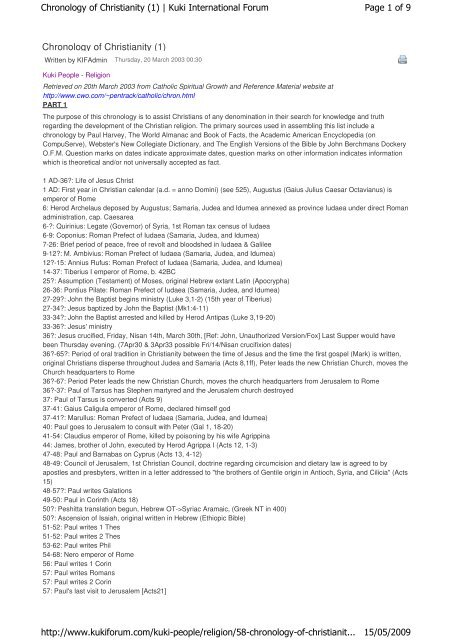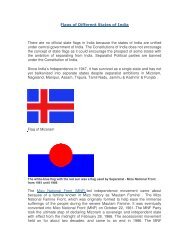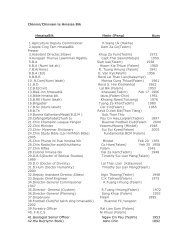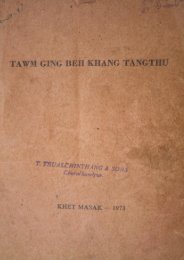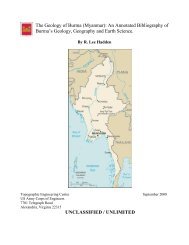Chronology of Christianity (1) - Zomi Online Library
Chronology of Christianity (1) - Zomi Online Library
Chronology of Christianity (1) - Zomi Online Library
You also want an ePaper? Increase the reach of your titles
YUMPU automatically turns print PDFs into web optimized ePapers that Google loves.
<strong>Chronology</strong> <strong>of</strong> <strong>Christianity</strong> (1) | Kuki International Forum<br />
<strong>Chronology</strong> <strong>of</strong> <strong>Christianity</strong> (1)<br />
Written by KIFAdmin Thursday, 20 March 2003 00:30<br />
Kuki People - Religion<br />
Retrieved on 20th March 2003 from Catholic Spiritual Growth and Reference Material website at<br />
http://www.cwo.com/~pentrack/catholic/chron.html<br />
PART 1<br />
Page 1 <strong>of</strong> 9<br />
The purpose <strong>of</strong> this chronology is to assist Christians <strong>of</strong> any denomination in their search for knowledge and truth<br />
regarding the development <strong>of</strong> the Christian religion. The primary sources used in assembling this list include a<br />
chronology by Paul Harvey, The World Almanac and Book <strong>of</strong> Facts, the Academic American Encyclopedia (on<br />
CompuServe), Webster's New Collegiate Dictionary, and The English Versions <strong>of</strong> the Bible by John Berchmans Dockery<br />
O.F.M. Question marks on dates indicate approximate dates, question marks on other information indicates information<br />
which is theoretical and/or not universally accepted as fact.<br />
1 AD-36?: Life <strong>of</strong> Jesus Christ<br />
1 AD: First year in Christian calendar (a.d. = anno Domini) (see 525), Augustus (Gaius Julius Caesar Octavianus) is<br />
emperor <strong>of</strong> Rome<br />
6: Herod Archelaus deposed by Augustus; Samaria, Judea and Idumea annexed as province Iudaea under direct Roman<br />
administration, cap. Caesarea<br />
6-?: Quirinius: Legate (Governor) <strong>of</strong> Syria, 1st Roman tax census <strong>of</strong> Iudaea<br />
6-9: Coponius: Roman Prefect <strong>of</strong> Iudaea (Samaria, Judea, and Idumea)<br />
7-26: Brief period <strong>of</strong> peace, free <strong>of</strong> revolt and bloodshed in Iudaea & Galilee<br />
9-12?: M. Ambivius: Roman Prefect <strong>of</strong> Iudaea (Samaria, Judea, and Idumea)<br />
12?-15: Annius Rufus: Roman Prefect <strong>of</strong> Iudaea (Samaria, Judea, and Idumea)<br />
14-37: Tiberius I emperor <strong>of</strong> Rome, b. 42BC<br />
25?: Assumption (Testament) <strong>of</strong> Moses, original Hebrew extant Latin (Apocrypha)<br />
26-36: Pontius Pilate: Roman Prefect <strong>of</strong> Iudaea (Samaria, Judea, and Idumea)<br />
27-29?: John the Baptist begins ministry (Luke 3,1-2) (15th year <strong>of</strong> Tiberius)<br />
27-34?: Jesus baptized by John the Baptist (Mk1:4-11)<br />
33-34?: John the Baptist arrested and killed by Herod Antipas (Luke 3,19-20)<br />
33-36?: Jesus' ministry<br />
36?: Jesus crucified, Friday, Nisan 14th, March 30th, [Ref: John, Unauthorized Version/Fox] Last Supper would have<br />
been Thursday evening. (7Apr30 & 3Apr33 possible Fri/14/Nisan crucifixion dates)<br />
36?-65?: Period <strong>of</strong> oral tradition in <strong>Christianity</strong> between the time <strong>of</strong> Jesus and the time the first gospel (Mark) is written,<br />
original Christians disperse throughout Judea and Samaria (Acts 8,1ff), Peter leads the new Christian Church, moves the<br />
Church headquarters to Rome<br />
36?-67: Period Peter leads the new Christian Church, moves the church headquarters from Jerusalem to Rome<br />
36?-37: Paul <strong>of</strong> Tarsus has Stephen martyred and the Jerusalem church destroyed<br />
37: Paul <strong>of</strong> Tarsus is converted (Acts 9)<br />
37-41: Gaius Caligula emperor <strong>of</strong> Rome, declared himself god<br />
37-41?: Marullus: Roman Prefect <strong>of</strong> Iudaea (Samaria, Judea, and Idumea)<br />
40: Paul goes to Jerusalem to consult with Peter (Gal 1, 18-20)<br />
41-54: Claudius emperor <strong>of</strong> Rome, killed by poisoning by his wife Agrippina<br />
44: James, brother <strong>of</strong> John, executed by Herod Agrippa I (Acts 12, 1-3)<br />
47-48: Paul and Barnabas on Cyprus (Acts 13, 4-12)<br />
48-49: Council <strong>of</strong> Jerusalem, 1st Christian Council, doctrine regarding circumcision and dietary law is agreed to by<br />
apostles and presbyters, written in a letter addressed to "the brothers <strong>of</strong> Gentile origin in Antioch, Syria, and Cilicia" (Acts<br />
15)<br />
48-57?: Paul writes Galations<br />
49-50: Paul in Corinth (Acts 18)<br />
50?: Peshitta translation begun, Hebrew OT->Syriac Aramaic, (Greek NT in 400)<br />
50?: Ascension <strong>of</strong> Isaiah, original written in Hebrew (Ethiopic Bible)<br />
51-52: Paul writes 1 Thes<br />
51-52: Paul writes 2 Thes<br />
53-62: Paul writes Phil<br />
54-68: Nero emperor <strong>of</strong> Rome<br />
56: Paul writes 1 Corin<br />
57: Paul writes Romans<br />
57: Paul writes 2 Corin<br />
57: Paul's last visit to Jerusalem [Acts21]<br />
http://www.kukiforum.com/kuki-people/religion/58-chronology-<strong>of</strong>-christianit...<br />
15/05/2009
<strong>Chronology</strong> <strong>of</strong> <strong>Christianity</strong> (1) | Kuki International Forum<br />
Page 2 <strong>of</strong> 9<br />
58: Paul arrested, imprisoned in Caesarea [Acts25:4]<br />
59: Nero kills his mother, Agrippina<br />
60: Paul imprisoned in Rome (Acts 28,16)<br />
61-63?: Paul? writes Ephesians<br />
61-63: Paul writes Philemon<br />
61-63: Paul writes Colossians<br />
61-63?: Paul? writes 1,2 Timothy, Titus, known as "pastoral epistles"<br />
62?: James written by leader <strong>of</strong> Jerusalem community? (Gal 2,9?), "catholic" epistle<br />
62: Paul martyred for treason in Rome<br />
62: {Being therefore this kind <strong>of</strong> person [i.e., a heartless Sadducee], Ananus, thinking that he had a favorable opportunity<br />
because Festus had died and Albinus was still on his way, called a meeting [literally, "sanhedrin"] <strong>of</strong> judges and brought<br />
into it the brother <strong>of</strong> Jesus-who-is-called-Messiah, James by name, and some others. He made the accusation that they<br />
had transgressed the law, and he handed them over to be stoned.} [JA20.9.1,Marginal Jew,p.57]<br />
62: Nero kills his wife Octavia and marries Poppaea Sabina<br />
64: Great fire <strong>of</strong> Rome, started by Nero and blamed on Christians, {Therefore to squelch the rumor , Nero created<br />
scapegoats and subjected to the most refined tortures those whom the common people called "Christians," [a group]<br />
hated for their abominable crimes. Their name comes from Christ, who, during the reign <strong>of</strong> Tiberius, had been executed<br />
by the procurator Pontius Pilate. Suppressed for the moment, the deadly superstition broke out again, not only in Judea,<br />
the land which originated this evil, but also in the city <strong>of</strong> Rome, where all sorts <strong>of</strong> horrendous and shameful practices from<br />
every part <strong>of</strong> the world converge and are fervently cultivated.} [Tacitus Annals 15.44;Marginal Jew;Meier;p.89-90]<br />
64-95?: 1 Peter written in Rome, by Peter the apostle?, "catholic" epistle<br />
65-125: Period in which 4 Gospels, Acts, Revelations, and remaining epistles written - Peter martyred before 1st Holy<br />
Gospel is written, 7 Popes before last epistle is completed<br />
65?: Q written, (German:Quelle, meaning "source") a hypothetical Greek text used in writing <strong>of</strong> Matthew and Luke<br />
65-150: Didache: Instructions <strong>of</strong> the Apostles written<br />
65-150: Dialogue <strong>of</strong> the Savior, Gospel <strong>of</strong> Peter<br />
65-150: Papyrus Oxyrhynchus 1224 fragments: pub. 1914<br />
65-150: Gospel <strong>of</strong> Thomas written, based on Q?, pub. 1959, Greek originals: Papyrus Ox. 1,654-5<br />
65-175: Papyrus Oxyrhynchus 840 fragments: pub. 1908<br />
65-175: Papyrus Egerton 2 (Unknown Gospel) fragments: pub. 1935/87, in Greek from Palestine, one <strong>of</strong> the oldest extant<br />
Christian texts (~175)<br />
65-250: Papyrus Fayum (P. Vindob. G. 2325) fragments: pub. 1887<br />
65-350: "Jewish-Christian Gospels": 7 fragments <strong>of</strong> Gospel <strong>of</strong> the Ebionites and 7 fragments <strong>of</strong> Gospel <strong>of</strong> the Hebrews in<br />
Greek; 36 fragments <strong>of</strong> Gospel <strong>of</strong> the Nazarenes in Aramaic; [Ref: NT Apocrypha, W. Schneemelcher, vol. 1]<br />
66-70: Roman-Jewish War: final destruction <strong>of</strong> Second Temple (Herod's Temple)<br />
67: Peter martyred, crucified upside down in Rome<br />
67-78: Pope Linus, 2nd Pope, succeeds Peter (Linus mentioned in 2 Tm 4,21)<br />
67: General Vespasian <strong>of</strong> Rome conquers Galilee<br />
68: Nero commits suicide, resurrects as "Nero redivivus", Rev's 666? (see 81)<br />
68: Galba emperor <strong>of</strong> Rome (6/68-1/69)<br />
68: Qumran (Essenes?) community destroyed by Rome, site <strong>of</strong> Dead Sea Scrolls found in 1949<br />
69: Otho emperor <strong>of</strong> Rome (1/69-4/69)<br />
69: Vitellius emperor <strong>of</strong> Rome (6/69-12/69)<br />
69: Flavian Dynasty <strong>of</strong> Rome (Vespian, Titus, Domitian)<br />
69-79: Vespian emperor <strong>of</strong> Rome, quells unrest in Rome and Jerusalem<br />
70: Collapse <strong>of</strong> Jewish self-government in Judea and destruction <strong>of</strong> the Temple in Jerusalem<br />
70: Gospel according to Mark written in Rome, by Peter's interpreter? (1 Peter 5,13), original ending apparently lost,<br />
endings added c 400<br />
70?: "Signs Gospel" written, hypothetical Greek text used in Gospel <strong>of</strong> John to prove Jesus is the Messiah<br />
70-640: Sanhedrin (High Court) period <strong>of</strong> Judaism, rise <strong>of</strong> house <strong>of</strong> Hillel<br />
75-90: Gospel according to Luke written, based on Mark and Q<br />
75-90: Acts <strong>of</strong> the Apostles written, same author as Gospel according to Luke<br />
79-81: Titus emperor <strong>of</strong> Rome, eldest son <strong>of</strong> Vespasian<br />
79-91: Pope Anacletus, 3rd Pope, known as "blameless" (as in Titus 1,7?)<br />
79: Mt Vesuvius, volcano overlooking Naples Bay, erupts, engulfs Pompeii<br />
80-85: Gospel according to Matthew written, based on Mark and Q, most popular in early Church<br />
81-96: Domitian emperor <strong>of</strong> Rome, son <strong>of</strong> Vespasian, "Nero redivivus?" (see 68)<br />
81-96: Revelations written, by John (son <strong>of</strong> Zebedee) and/or a disciple <strong>of</strong> his<br />
90-100: 1 John written, by author(s) <strong>of</strong> 4th gospel, "catholic" epistle<br />
90-100: 2,3 John written, by "elder", disciple <strong>of</strong> John (son <strong>of</strong> Zebedee)?, "catholic" epistle<br />
http://www.kukiforum.com/kuki-people/religion/58-chronology-<strong>of</strong>-christianit...<br />
15/05/2009
<strong>Chronology</strong> <strong>of</strong> <strong>Christianity</strong> (1) | Kuki International Forum<br />
Page 3 <strong>of</strong> 9<br />
90-100: Gospel according to John written, by John (son <strong>of</strong> Zebedee) and others, only eyewitness to Jesus?, disciple<br />
Jesus loved?, Gnostic?<br />
90?: Josephus claims exactly 22 Jewish (OT) books: 5 Law, 13 History, 4 Hymns<br />
91-101: Pope Clement I, 4th Pope, (mentioned in Phil 4,3), wrote letter to Corinth in 95 called "1 Clement"<br />
94: "Jewish Antiquities", by Josephus in Aramaic, trans. to Grk., Testimonium Flavianum: {At this time there appeared<br />
Jesus, a wise man. For he was a doer <strong>of</strong> startling deeds, a teacher <strong>of</strong> people who receive the truth with pleasure. And he<br />
gained a following both among many Jews and among many <strong>of</strong> Greek origin. And when Pilate, because <strong>of</strong> an accusation<br />
made by the leading men among us, condemned him to the cross, those who had loved him previously did not cease to<br />
do so. And up until this very day the tribe <strong>of</strong> Christians (named after him) has not died out.} [JA18.3.3 Meier redaction,<br />
Marginal Jew, p.61]<br />
96?: Hebrews written, by ?<br />
96-98: Nerva emperor <strong>of</strong> Rome<br />
98-116: Trajan emperor <strong>of</strong> Rome, Roman empire reaches maximum size<br />
100?: Odes <strong>of</strong> Solomon, written in Greek or Syriac, ref by John? (Apocrypha)<br />
100?: Epistle <strong>of</strong> Barnabas, Christian exegesis <strong>of</strong> LXX (AF = Apostolic Fathers)<br />
100?: 2 Clement, an old sermon but not by Clement (AF = Apostolic Fathers)<br />
100?: 2 Esdras (Vg:4 Esdras), Hebrew?, claims 24 OT books (Vulgate & Peshitta)<br />
100?: pocalypse <strong>of</strong> Baruch (2 Baruch:Syriac, 3 Baruch:Greek) (Peshitta)<br />
100?: Paralipomena <strong>of</strong> Jeremiah (4 Baruch), written in Hebrew (Ethiopic Bible)<br />
100?: Testaments <strong>of</strong> the Twelve Patriarchs, Aramaic and Hebrew fragments found at Qumran Caves 1,4 (Armenian<br />
Bible)<br />
100?: Jude written, probably by doubting relative <strong>of</strong> Jesus (Mark 6,3), rejected by some early Christians due to its<br />
reference to apocryphal Book <strong>of</strong> Enoch (v14), "catholic" epistle<br />
100-125?: 2 Peter written, by ?, not accepted into canon until early 400s, drew upon Epistle <strong>of</strong> Jude, "catholic" epistle<br />
100-150: Secret Book (Apocryphon) <strong>of</strong> James, Gospel <strong>of</strong> Mary Magdalene, Infancy Gospels <strong>of</strong> Thomas and James,<br />
Secret Gospel (<strong>of</strong> Mark) (Complete Gospels)<br />
101-109: Pope Evaristus, 5th Pope<br />
109-116: Pope Alexander, 6th Pope<br />
110?: Letter <strong>of</strong> Polycarp to the Philippians, written by Polycarp (160) (AF)<br />
110?: "Letters <strong>of</strong> Ignatius", bishop <strong>of</strong> Antioch, martyred in Rome, his letters were subjected to heavy Christian forgery<br />
esp. 4th cent. (Apostolic Fathers)<br />
116-125: Pope Sixtus I, 7th Pope<br />
117-138: Hadrian emperor <strong>of</strong> Rome, builds wall across Britain<br />
125-350: Period <strong>of</strong> <strong>Christianity</strong> during which the first Bible was assembled - Christians are fiercely persecuted and then<br />
finally tolerated by the Roman Empire, Great Plague in Rome<br />
125-136: Pope Telesphorus, 8th Pope, martyred<br />
125?: Papyrus 52: oldest extant NT fragment, p.1935, parts <strong>of</strong> Jn18:31-33,37-38<br />
125?: Shepherd <strong>of</strong> Hermas, written in Rome (AF = Apostolic Fathers)<br />
130-200: "Christian Apologists" writings against Roman Paganism by: Justin Martyr (165), Athenagoras (180?), Aristides<br />
(145?), Theophilus <strong>of</strong> Antioch (185?), Tatian (170), Quadratus (130?), Melito <strong>of</strong> Sardis (180?), Apollinaris <strong>of</strong> Hierapolis<br />
(180?), also Epistle to Diognetus in Apostolic Fathers<br />
130?: "Gospel <strong>of</strong> Basilides", a 24 book commentary?, lost<br />
130?: Papias, bishop <strong>of</strong> Hierapolis in Asia Minor, wrote: "Expositions <strong>of</strong> the Sayings <strong>of</strong> the Lord", lost, widely quoted, see<br />
Eusebius (340) (AF)<br />
130?: Aquila <strong>of</strong> Pontus, Roman convert to <strong>Christianity</strong> then to Judaism, student <strong>of</strong> Rabban Gamaliel, compiled literal<br />
Greek OT translation in Jabneh (Jamnia)<br />
132-135: Bar Kokhba Revolt: final Jewish revolt, Judea and Jerusalem erased from maps, all <strong>of</strong> southern Syria renamed<br />
Palestine (coined by Herodotus)<br />
138-161: Antoninus Pius emperor <strong>of</strong> Rome<br />
138-142: Pope Hyginus, 9th Pope<br />
140: Letters <strong>of</strong> Marcion, produces his own canon without OT and using only a heavily edited Luke + 10 Pauline Epistles,<br />
cites "Western" Gospel text-type<br />
140?: Apocalypse <strong>of</strong> Peter, written in Greek [NT Apocrypha,Schneemelcher,v.2]<br />
142-155: Pope Pius I, 10th Pope<br />
150?: Gospel <strong>of</strong> the Egyptians, Coptic translation <strong>of</strong> orig. Greek (Nag Hammadi)<br />
150?: "Western Revisor" adds/subtracts from original Acts to produce "Western" version which is 10% larger and found<br />
in Papyrus P29,38,48 and Codex Bezae (D)<br />
150?: Papyrus Chester Beatty 6: R963, Greek Num 5:12-36:13, Deut 1:20-34:12<br />
155-166: Pope Anicetus, 11th Pope<br />
160?: Polycarp, bishop <strong>of</strong> Smyrna, martyred at age 86: "Let. to Philip." (110)<br />
http://www.kukiforum.com/kuki-people/religion/58-chronology-<strong>of</strong>-christianit...<br />
15/05/2009
<strong>Chronology</strong> <strong>of</strong> <strong>Christianity</strong> (1) | Kuki International Forum<br />
Page 4 <strong>of</strong> 9<br />
160?: Martyrdom <strong>of</strong> Polycarp, in Greek (Apostolic Fathers, ISBN:0-8010-5676-4)<br />
161-180: Marcus Aurelius emperor <strong>of</strong> Rome<br />
164-180: Great Plague in Roman Empire<br />
166-174: Pope Soter, 12th Pope, moved Easter from Nisan 14 to following Sunday<br />
170: Letters <strong>of</strong> Irenaeus, bishop <strong>of</strong> Lyons, cites "Western" Gospel text-type<br />
170: Christian council on Montanist sect in Asia Minor<br />
170: Letters <strong>of</strong> Dionysius, bishop <strong>of</strong> Corinth, claims Christians were changing and faking his own letters just as [he knew]<br />
they had changed the Gospels<br />
170: Tatian produces "Diatessaron" (Harmony) by blending 4 "Western" text-type Gospels into 1<br />
170?: Symmachus, an Ebionite, writes an entirely new Greek OT translation<br />
174-189: Pope Eleutherius, 13th Pope<br />
175?: Acts <strong>of</strong> Paul (inc. 3 Cor.), in Greek [NT Apocrypha,Schneemelcher,v.2]<br />
180-192: Commodus emperor <strong>of</strong> Rome<br />
185-350: Canon Muratorian, 1st extant for NT?, written in Rome by Hippolytus?, excludes Hebrews, James, 1-2 Peter, 3<br />
John; includes Wisdom <strong>of</strong> Solomon, Apocalypse <strong>of</strong> Peter<br />
189-198: Pope Victor I, 1st Latin Pope, 14th Pope, excommunicated Eastern churches that continued to observe Easter<br />
on Nisan 14 "Quartodeciman", (see 166, 190)<br />
190: Christian council to determine "<strong>of</strong>ficial" date <strong>of</strong> Easter<br />
193-211: Septimius Severus emperor <strong>of</strong> Rome<br />
197: Writings <strong>of</strong> Apollonius, uses the term "catholic" in reference to 1 John<br />
198-217: Pope Zephyrinus, 15th Pope<br />
200: Bishop <strong>of</strong> Antioch notes Gospel <strong>of</strong> Peter (see 65?) being used in Cilicia<br />
200?: Papyrus 66: 2nd Bodmer, John, 1956, "Alexandrian/Western" text-types: Jn 1:1-6:11,35-7:52;8:12-14:26,29-<br />
30;15:2-26;16:2-4,6-7,10-20:20,22-23,25-21:9<br />
200?: Papyrus 75: Bodmer 14-15, Luke & John, earliest extant Luke, ~Vaticanus; Lk3:18-22,33-4:2,34-5:10,37-6:4,10-<br />
7:32,35-39,41-43,46-9:2,4-17:15,19-18:18; 22:4-24:53; Jn1:1-7:52;8:12-11:45,48-57;12:3-13:1,8-9;14:8-30;15:7-8<br />
200?: Papyrus 46: 2nd Chester Beatty, "Alexandrian" text-type: Rm5:17-6:3,5-14;8:15-25,27-35,37-9:32;10:1-11:22,24-<br />
33,35-15:9,11-16:27;Hb1:1-9:16,18-10:20,22-30,32-13:25;1Cr1:1-9:2,4-14:14,16-15:15,17-16:22;2Cr1:1-11:10,12-21,23-<br />
13:13;Ep1:1-2:7,10-5:6,8-6:6,8,20-24;Gl1:1-8,10-2:9,12-21;3:2-29;4:2-18,20-5:17,20-6:8,10-18;Ph1:1,5-15,17-28,30-<br />
2:12,14-27,29-3:8,10-21;4:2-12,14-23;Cl1:1-2,5-13,16-24,27-2:19,23-3:11,13-24;4:3-12,16-18;1Th1:1,9-2:3;5:5-9,23-28<br />
200?:Papyrus 32: J. Rylands <strong>Library</strong>: Titus 1:11-15;2:3-8<br />
200?: Papyrus 64 (+67): Mt3:9,15;5:20-22,25-28;26:7-8,10,14-15,22-23,31-33<br />
200?: Old Syriac (Aramaic) Gospels, Syr(s) & Syr(c), <strong>of</strong> "Western" text-type<br />
200?: Latin Bible translations begun in Carthage?, originals no longer extant<br />
200?: Sahidic Coptic cop(sa) Bible translations written in Alexendria<br />
212-217: Geta then Caracalla emperors <strong>of</strong> Rome<br />
217-236: Anti-Pope Hippolytus, bishop <strong>of</strong> Rome, "Logos" sect, 1st Anti-Pope (illegitimate claimants <strong>of</strong> or pretenders to<br />
the papal throne)<br />
217-222: Pope Callistus I, 16th Pope<br />
218-222: Heliogabalus emperor <strong>of</strong> Rome<br />
220: Goths invade Asia Minor and Balkans<br />
220?: Clement <strong>of</strong> Alexandria, b.150?, bishop, cites "Alexandrian" NT text-type & Secret Gospel <strong>of</strong> Mark & Gospel <strong>of</strong> the<br />
Egyptians; wrote: "Exhortations to the Greeks";"Rich Man's Salutation";"To the Newly Baptized"; (Loeb Classics)<br />
222-230: Pope Urban I, 17th Pope<br />
222-235: Alexandar Severus emperor <strong>of</strong> Rome<br />
223?: Tertullian, wr: "de Spectaculis" (Latin): v30.6 cites rumor Jesus son <strong>of</strong> prostitute, coined "New Testament", cites<br />
"Western" Gospel text-type (Loeb)<br />
225?: Papyrus 45: 1st Chester Beatty, Gospels (Caesarean), Acts (Alexandrian): Mt20:24-32;21:13-19;25:41-26:39;<br />
Mk4:36-40;5:15-26,38-6:3,16-25,36-50;7:3-15 ,25-8:1,10-26,34-9:9,18-31;11:27-12:1,5-8,13-19,24-28; Lk6:31-41,45-<br />
7:7;9:26 -41,45-10:1,6-22,26-11:1,6-25,28-46,50-12:12,18-37,42-13:1,6-24,29-14:10,17-33; Jn10:7-25,30-11:10,18-<br />
36,42-57; Ac4:27-36;5:10-21,30-39;6:7-7:2,10-21,32-41,52-8:1,14-25,34-9:6,16-27,35-10:2,10-23,31-41;11:2-14,24-<br />
12:5,13-22;13:6-16,25-36,46-14:3,15-23;15:2-7,19-27,38-16:4,15-21,32-40;17:9-17<br />
225?: Papyrus 967: Chester Beatty 9, Greek Ezekiel 11:25-end, ~Codex Vaticanus<br />
230-236: Pope Pontian, 18th Pope<br />
230-250: Christian council <strong>of</strong> Rome, Demetrius bishop <strong>of</strong> Alex. condemns Origen who in 248 cited a rumor recorded by<br />
Celsus that "Jesus fabricated the account <strong>of</strong> his birth from a virgin. In reality, Jesus' mother was driven out by the<br />
carpenter husband to whom she was betrothed because she had committed adultery with a [Roman] soldier named<br />
Panthera [thus the ben Pantere <strong>of</strong> Jewish sources]. Left poor and homeless, she gave birth to Jesus in secret. Jesus<br />
later spent time in Egypt, where he hired himself out as a laborer, learned magic, and so came to claim the title <strong>of</strong><br />
God." [CC1.28-32, Marginal Jew, Meier, p. 223]<br />
http://www.kukiforum.com/kuki-people/religion/58-chronology-<strong>of</strong>-christianit...<br />
15/05/2009
<strong>Chronology</strong> <strong>of</strong> <strong>Christianity</strong> (1) | Kuki International Forum<br />
Page 5 <strong>of</strong> 9<br />
236-238: Maximus emperor <strong>of</strong> Rome, ends Christian schism in Rome by deporting Pope Pontian and anti-Pope<br />
Hippolytus to Sardinia where they soon die<br />
236-237: Pope Anterus, 19th Pope<br />
237-250: Pope Fabian, 20th Pope<br />
238-244: Gordian I, II, Balbinus, Pupienus, Gordian III emperors <strong>of</strong> Rome<br />
240-250: Christian council <strong>of</strong> Carthage<br />
244-249: Philip the Arabian emperor <strong>of</strong> Rome<br />
249-251: Decius emperor <strong>of</strong> Rome<br />
249: Rome celebrates 1000th anniversary<br />
250: Rome steps up persecution <strong>of</strong> Christians, martyrs revered as saints<br />
250: Letters <strong>of</strong> Methodius, Pistis Sophia, Porphyry Tyrius; church fathers<br />
250?: Mandeans (followers <strong>of</strong> John the Baptist) begin compilation <strong>of</strong> "Ginza"<br />
250?: Papyrus 72: Bodmer 5-11+, pub. 1959, "Alexandrian" text-type: Nativity <strong>of</strong> Mary; 3Cor; Odes <strong>of</strong> Solomon 11; Jude<br />
1-25; Melito's Homily on Passover; Hymn fragment; Apology <strong>of</strong> Phileas; Ps33,34; 1Pt1:1-5:14; 2Pt1:1-3:18;<br />
250?: Papyrus Chester Beatty: #5:R962: Gn8:13-9:2,24:13-46:33,Enoch91-105; #7: I8:18-19:13,38:14-45:5,54:1=60:22;<br />
#8: Jr4:30-5:24; #10: Dn1-12:13(+Add),Bel4-39,Sus5-end,Esther1:1a-8:6(+Add)<br />
251-253: Gallus emperor <strong>of</strong> Rome<br />
251-253: Pope Cornelius, 21st Pope<br />
251-258: Anti-Pope Novatian, decreed no forgiveness for sins after baptism<br />
253-260: Valerian emperor <strong>of</strong> Rome, executes all Bishops, Priests, and Deacons<br />
253-254: Pope Lucius I, 22nd Pope<br />
254: Letters <strong>of</strong> Origen, Jesus and God one substance, adopted at Council <strong>of</strong> Nicaea in 325, compiled "Hexapla": 6<br />
versions <strong>of</strong> LXX side by side: Hebrew, Hebrew transliterated in Greek, Aquila's Greek trans., Symmachus' Greek trans.,<br />
Origen's revised LXX Greek trans., Theodotion's revised LXX; also Quinta/Sexta/Septima trans., Tetragrammaton in<br />
square Hebrew script; cites "Alexandrian" & "Caesarean" NT text-types; Eusebius claimed Origen castrated himself for<br />
Christ due to Mt19:12 [EH6.8.1-3]<br />
254-257: Pope Steven I, 23rd Pope, major schism over rebaptizing heretics and apostates<br />
257-258: Pope Sixtus II, 24th Pope, martyred<br />
257: Visigoths and Ostrogoths invade Black Sea area, Franks invade Spain<br />
258: Letters <strong>of</strong> Cyprian, Bishop <strong>of</strong> Carthage, cites "Western" NT text-type, claims Christians are freely forging his letters<br />
to discredit him<br />
260-268: Gallienus emperor <strong>of</strong> Rome, reverses Valerian, restores Roman Church<br />
260-268: Pope Dionysius, 25th Pope, rebuilds Roman Church after Valerian's massacre<br />
264-268: Christian council on Paul <strong>of</strong> Samosata, Bishop <strong>of</strong> Antioch, founder <strong>of</strong> Adoptionism (Jesus was human until Holy<br />
Spirit descended at his baptism)<br />
264?: Letters <strong>of</strong> Dionysius, bishop <strong>of</strong> Alexandria, b.190?<br />
268: Goths sack Athens, Sparta, Corinth<br />
268-270: Claudius II emperor <strong>of</strong> Rome<br />
269-274: Pope Felix I, 26th Pope<br />
270-275: Aurelian emperor <strong>of</strong> Rome<br />
275-283: Pope Eutychian, 27th Pope, decreed that only beans and grapes be blessed at Mass<br />
275?: Papyrus 47: 3rd Chester Beatty, ~Sinaiticus, Rv9:10-11:3,5-16:15,17-17:2<br />
276-282: Marcus Aurelius Probus emperor <strong>of</strong> Rome<br />
276: Mani, b.215, crucified, founder <strong>of</strong> Manichaean Christian sect in Persia<br />
283-296: Pope Gaius, 28th Pope<br />
284-305: Diocletian emperor <strong>of</strong> Rome, notorius persecuter <strong>of</strong> Christians<br />
285: Roman empire partitioned into Western and Eastern empires<br />
290-345: St Pachomius establishes 1st monastery in Egypt<br />
296-304: Pope Marcellinus, 29th Pope, apostate, <strong>of</strong>fered pagan sacrifices for Diocletian<br />
300?: Bohairic Coptic cop(bo) Bible translations written in Alexandria<br />
300?: Hesychius <strong>of</strong> Alex., martyr, translates Hebrew OT to Greek, lost [Jerome]<br />
300?: Papyrus Berlin Codex <strong>of</strong> Greek Genesis; Papyrus Bodmer 24 <strong>of</strong> Greek Psalms; Codex Freer <strong>of</strong> Greek Minor<br />
Prophets; all published in 1927<br />
300?: other 3rd century NT witnesses: P1:Mt1:1-9,12,14-20 P4:Lk1:58-59,62-2:1, 6-7;3:8-4:2,29-32,34-35;5:3-8,30-6:16<br />
P5:Jn1:23-31,33-40;16:14-30;20:11-17, 19-20,22-25 P9:1Jn4:11-12,14-17 P12:Hb1:1P15:1Cr7:18-8:4 P20:Jm2:19-3:9<br />
P22:Jn15:25-16:2,21-32 P23:Jm1:10-12,15-18 P27:Rm8:12-22,24-27,33-9:3,5-9 P28:Jn6:8-12,17-22 P29:Ac26:7-8,20<br />
P30:1Th4:12-13,16-17;5:3,8-10,12-18,25-28;2Th1:1-2 P38:Ac18:27-19:6,12-16 P39:Jn8:14-22 P40:Rm1:24-27,31-<br />
2:3;3:21-4:8;6:4-5:16;9:16-17:27 P48:Ac23:11-17,23-29 P49:Ep4:16-29,31-5:13 P53:Mt26:29-40;Ac9:33-10:1<br />
P65:1Th1:3-2:1,6-13 P69:Lk22:41,45-48,58-61 P70:Mt2:13-16,22-3:1;11:26-27;12:4-5;24:3-6,12-15 P80:Jn3:34<br />
P87:Pm13-15,24-25 #0171:Mt10:17-23,25-32;Lk22:44-56,61-64 #0189:Ac5:3-21 #0220:Rm4:23-5:3,8-13 #0212<br />
http://www.kukiforum.com/kuki-people/religion/58-chronology-<strong>of</strong>-christianit...<br />
15/05/2009
<strong>Chronology</strong> <strong>of</strong> <strong>Christianity</strong> (1) | Kuki International Forum<br />
Page 6 <strong>of</strong> 9<br />
(Diatessaron):Mt27:56-57;Mk15:40-42;Lk23:49-51,54;Jn19:38<br />
303-311: Last persecution <strong>of</strong> Christians in Rome<br />
304: Letters <strong>of</strong> Victor, bishop <strong>of</strong> Pettau<br />
306-337: Emperor Constantine the Great, convert to <strong>Christianity</strong><br />
306-312: Maxentius emperor <strong>of</strong> Western Roman Empire<br />
306-308: Pope Marcellus I, 30th Pope, tried removing prior Pope Marcellinus from <strong>of</strong>ficial records for apostasy, exiled<br />
from Rome by Maxentius for disturbing the peace<br />
310: Pope Eusebius, 31st Pope, deported to Sicily with anti-Pope Heraclius by Maxentius<br />
311-314: Pope Miltiades, 32nd Pope, Constantine gives Fausta's palace as papal residence<br />
312: Lucian, founded Exegetical School <strong>of</strong> Antioch, martyred<br />
312: Constantine defeats Maxentius at Milvian Bridge, reunites Roman Empire<br />
313: Edict <strong>of</strong> Milan, Constantine establishes toleration <strong>of</strong> <strong>Christianity</strong><br />
313: Miltiades excommunicates Donatus for requiring rebaptism <strong>of</strong> apostates<br />
314-335: Pope Silvester I, 33rd Pope<br />
314: Council <strong>of</strong> Arles, called by Constantine against Donatist (Donatus) schism<br />
317: Letters <strong>of</strong> Lactantius, early Christian church father<br />
321: Constantine decrees Sunday as <strong>of</strong>fical Roman-Christian day <strong>of</strong> rest<br />
325: Council <strong>of</strong> Nicaea, called by Constantine against Arianism (336), called 1st great Christian council by Jerome, 1st<br />
ecumenical, 318 bishops attend, Nicaean Creed<br />
325?: Fayyumic Coptic cop(mf) translation fragment <strong>of</strong> John 6:11-15:11<br />
330: Old Saint Peter's Basilica dedicated by Constantine, located over the traditional burial site <strong>of</strong> Saint Peter the Apostle<br />
in Rome on Vatican Hill<br />
331: Seat <strong>of</strong> Roman Empire moved to Constantinople (formally Byzantium)<br />
336-337: Pope Mark, 34th Pope<br />
336: Arius, Greek theologian - Arianism (Jesus was a created being)<br />
337-350: Roman empire splits again, Constans emperor <strong>of</strong> West until 350<br />
337-361: Roman empire splits again, Constantius emperor <strong>of</strong> East until 361<br />
337-352: Pope Julius I, 35th Pope<br />
338: Jewish calendar modified with different year lengths to correct to Solar<br />
340?: Eusebius <strong>of</strong> Caesarea (260-340), theologian & church historian, cites "Caesarean" NT text-type, wrote:<br />
"Ecclesiastical History" (EH); Loeb Classics: 2 volumes {Papias, bishop <strong>of</strong> Hierapolis (130?), claims that John the Elder,<br />
a disciple <strong>of</strong> Jesus, told him that Mark "was the interpreter <strong>of</strong> Peter and wrote down carefully what he remembered <strong>of</strong><br />
what had been said or done by the Lord, but not in the right order." Also claims that "Matthew composed the sayings in<br />
Hebrew [more likely Aramaic] and each one translated them as he could."} [Ref: EH3.39.15, Unauthorized Version, Fox,<br />
p.126-127] Eusebius' NT Canon: Recognized Books: 4 Holy Gospels, Acts, 14 Pauline Epistles, 1Jn, 1Pt; Disputed<br />
Books: Rev, James, Jude, 2Pt, 2-3Jn, Acts <strong>of</strong> Paul, Hermas, Apocalypse <strong>of</strong> Peter, Barnabas, Didache, Gospel <strong>of</strong> the<br />
Hebrews; Rejected Books: Gospels <strong>of</strong> Peter, Thomas, Matthias, Acts <strong>of</strong> Andrew, John ... [EH3.25], used the term<br />
"catholic" to refer to all seven epistles - James; 1,2,3 John; 1,2 Peter; Jude<br />
350-400: Period <strong>of</strong> time between the 1st Christian Bible and the 1st Western Christian Bible, during which the books<br />
contained in Bibles varied<br />
350: Letters <strong>of</strong> Adamantius, Firmicus Maternus; early Christian church fathers<br />
350?: Codex Sinaiticus (S or ): earliest Christian Bible, (LXX - 2-3 Maccabees - Psalms <strong>of</strong> Solomon - Ps151 + 27NT +<br />
Barnabas + Hermas), missing Hermas31.7-end; <strong>of</strong> "Alexandrian" text-type: most accurate text-type<br />
350?: Codex Vaticanus (B): earliest Christian Bible (LXX - 1-4Maccabees - Psalms <strong>of</strong> Solomon - Ps151 + 27NT), missing<br />
Gn1-46:28, Ps105:27-137:6, 1Tm-Phm, Heb9:14-end; <strong>of</strong> "Alexandrian" text-type: most accurate text-type<br />
350?: Papyrus Antinoopolis <strong>of</strong> Book <strong>of</strong> Proverbs in Greek, published in 1950<br />
350?: Papyrus Chester Beatty: #4:R961: Greek Gn9:1-44:22; #11: Greek Sir36:28- 37:22,46:6-47:2; #12: Greek<br />
Enoch93:12-13,94:7-8,97:6-104:13,106:1-107:3<br />
350?: Papyrus Bodmer 45-46: Greek Susanna, Daniel 1:1-20 (Theodotion's LXX)<br />
350?: Canon Cheltenham: 24NT books (excludes James, Jude, Hebrews)<br />
350?: Akhmimic cop(ac) & Sub-Akhmimic cop(ac2) Coptic translations <strong>of</strong> John<br />
350?: Ulfilas, apostle to the Goths (Germans), translates Greek NT to Gothic<br />
352-366: Pope Liberius, 36th Pope<br />
354-430: St. Augustine, Latin Bishop considered the founder <strong>of</strong> formalized Christian theology, church father<br />
355-365: Anti-Pope Felix II, Arianism (336), supported by Constantius II<br />
360: Huns invade Europe, scrolls begin to be replaced by books (Codex)<br />
361-363: Julian the Apostate emperor <strong>of</strong> East, attempts to revive Paganism<br />
363: Council <strong>of</strong> Laodicea names 26 NT books (excludes Revelations)<br />
363: Letters <strong>of</strong> Marius Victorinus, Acacius <strong>of</strong> Caesarea; early church fathers<br />
364: Council <strong>of</strong> Laodicea decrees death for Christians who keep 7th day Sabbath<br />
http://www.kukiforum.com/kuki-people/religion/58-chronology-<strong>of</strong>-christianit...<br />
15/05/2009
<strong>Chronology</strong> <strong>of</strong> <strong>Christianity</strong> (1) | Kuki International Forum<br />
Page 7 <strong>of</strong> 9<br />
366-384: Pope Damasus I, 37th Pope, hired thugs to massacre rival Ursinians (Liberians)<br />
366-367: Anti-Pope Ursinus, leader <strong>of</strong> supporters <strong>of</strong> former Pope Liberius<br />
367: Athanasias, bishop <strong>of</strong> Alexandria, first citing <strong>of</strong> modern 27 NT canon<br />
367: Letters <strong>of</strong> Hilary <strong>of</strong> Poitiers, Lucifer <strong>of</strong> Calaris; early church fathers<br />
367: Athanasius, d.373, bishop <strong>of</strong> Alexandria, first cite <strong>of</strong> modern 27NT canon<br />
370: Epiphanius, bishop <strong>of</strong> Salamis, Cyprus; cites 27NT + Wisdom <strong>of</strong> Solomon<br />
370: Doctrine <strong>of</strong> Addai at Edessa proclaims 17 book NT canon using Diatessaron (instead <strong>of</strong> the 4 Gospels) + Acts + 15<br />
Pauline Epistles (inc. 3 Corinthians)<br />
373: Letters <strong>of</strong> Ephraem Syrus, cites "Western" Acts text-type<br />
378: Letters <strong>of</strong> Titus <strong>of</strong> Bostra, Ambrosiaster, Priscillian; church fathers<br />
379-395: Theodosius the Great, last emperor <strong>of</strong> the united empire<br />
380: Feb 27, <strong>Christianity</strong> declared <strong>of</strong>ficial state religion by Theodosius<br />
381: Council <strong>of</strong> Theodosius at Constantinople, 2nd ecumenical, Jesus had true human soul<br />
382-384: Pope Damasus I has Jerome revise and unify Latin Bibles<br />
383: Roman legions begin to evacuate Britain<br />
384: Jerome presents Pope Damasus I with new Latin Gospels, originals lost<br />
384-399: Pope Siricius, 38th Pope, criticized Jerome<br />
390: Apollinaris <strong>of</strong> Laodicea, Jesus had human body but divine spirit<br />
390: Letters <strong>of</strong> Tyconius, Gregory <strong>of</strong> Nyssa, Didymus <strong>of</strong> Alex.; church fathers<br />
391?: Ammianus Marcellinus, b.330, Christian historian, wrote: "Res gestae"<br />
393,397: Augustine's Councils, cites exactly 27 NT books (see 354)<br />
395: Theodosius prohibits practice <strong>of</strong> Pagan rituals including Olympic Games<br />
395: Ausonius, b.310?, Christian governor <strong>of</strong> Gaul; Loeb Classics 2v (Latin)<br />
396: Alaric, king <strong>of</strong> the Visigoths, plunders Athens<br />
397: Ambrose, b.333?, bishop & governor <strong>of</strong> Milan, wrote: "de Fide" ...<br />
399-401: Pope Anastasius I, 39th Pope<br />
400-484: Era between 1st Western Christian Bible and the Great Schism - Christian doctrine is formed, Roman empire<br />
ends<br />
400?: Vulgate Bible, by Jerome?, (340?-420) originals lost, Vulgate Latin text becomes standard Western Christian Bible<br />
400?: Jerome cites "expanded" ending in Mark after Mark 16,14<br />
400?: Jerome adds Pericope <strong>of</strong> the Adultress (John 7,53-8,11)<br />
400?: Codex Vercellensis it(a): Latin Gospels, <strong>of</strong> "European" text-type<br />
400?: Peshitta Bible, Syriac (Aramaic) Vulgate, Syr(p), OT + 22 NT, excludes: 2Pt, 2-3Jn, Jude, Rev; Peshitta becomes<br />
standard Syrian Christian Bible<br />
400?: Codex Bobiensis it(k): ~half <strong>of</strong> Mt/Mk in Latin, "African" (Carthage) text-type, has "shorter" ending <strong>of</strong> Mark after<br />
Mk16:8<br />
401-417: Pope Innocent I, 40th Pope, decreed Roman custom the norm for <strong>Christianity</strong><br />
401: Visigoths invade Italy<br />
403: Letters <strong>of</strong> Epiphanius <strong>of</strong> Constantia, John Chrysostom; church fathers<br />
410: Visigoths sack Rome under king Alaric<br />
414: Letters <strong>of</strong> Nicetas <strong>of</strong> Remesiana, Orosius; early Christian church fathers<br />
415: Bishop Cyril <strong>of</strong> Alex. (444) expels Jews, kills Hypatia with oyster shells<br />
416: Visigoths take Spain<br />
417-418: Pope Zosimus, 41st Pope<br />
418-422: Pope Boniface I, 42nd Pope<br />
418-419: Anti-Pope Eulalius<br />
418: Franks take Gaul<br />
420: St. Jerome, (S.E. Hieronymus), b.340?, Latin scholar; (Loeb Classics)<br />
422-432: Pope Celestine I, 43rd Pope<br />
423: Theodoret, bishop <strong>of</strong> Cyrrhus, notes Tatian's Harmony (170) in heavy use<br />
431: Council <strong>of</strong> Ephesus, 3rd ecumenical, decreed Mary the Mother <strong>of</strong> God<br />
429: Picts and Scots expelled from southern England by Anglo-Saxon-Jutes<br />
430: St. Augustine, b.354, origin <strong>of</strong> "Original Sin," church father & philosopher, wrote: "The City <strong>of</strong> God", "Confessions";<br />
Loeb Classics 10 v. (Latin)<br />
430: Letters <strong>of</strong> Marcus Eremita, Nilus <strong>of</strong> Ancyra; Christian church fathers<br />
431: Syrian <strong>Christianity</strong> splits into East (Nestorian-disagreed with Council <strong>of</strong> Ephesus) and West (Jacobites)<br />
432: St Patrick begins mission in Ireland<br />
432-440: Pope Sixtus III, 44th Pope<br />
433-453: Attila the Hun, "Scourge <strong>of</strong> the Gods"<br />
440-461: Pope Leo I, 45th Pope<br />
http://www.kukiforum.com/kuki-people/religion/58-chronology-<strong>of</strong>-christianit...<br />
15/05/2009
<strong>Chronology</strong> <strong>of</strong> <strong>Christianity</strong> (1) | Kuki International Forum<br />
444: Letters <strong>of</strong> Cyril <strong>of</strong> Alexandria, Arnobius the Younger; church fathers<br />
450: Mark's Resurrection <strong>of</strong> Jesus added to Bible (Mark 16, 9-20)<br />
450?: Codex Alexandrinus (A): (LXX - 1-2Maccabees + 14_Church_Odes + 27NT +1-2Clement), missing 1K12:17-14:9,<br />
Ps49:20-79:11, Psalms <strong>of</strong> Solomon, Mt1-25:6, Jn6:50-8:52, 2Cr4:13-12:6, 1Clement57.7-63.4, 2Clement12.5b-end; <strong>of</strong><br />
"Alexandrian" text-type: most accurate text-type<br />
450?: Codex Bezae (D): Greek/Latin Gospels + Acts; Codex Washingtonianus (W): Greek Gospels; both <strong>of</strong> "Western"<br />
text-type: "fondness for paraphrase"<br />
450?: Codex Ephraemi Syri rescriptus (C): Greek LXX + 27NT, many gaps<br />
450?: Codex Marchalianus (Q): Greek LXX + Luke + John, many gaps<br />
450?: Codex Ambrosianus (F): Greek Genesis to Joshua<br />
450?: Codex Freer: Greek Deuteronomy and Joshua<br />
450?: Codex Colberto-Sarravianus: Origen's Greek Hexapla LXX <strong>of</strong> Gen-Judg<br />
450?: Codex Palatinus it(e): Latin Gospels, "African" (Carthage) text-type<br />
450?: Codex Veronensis it(b): Latin Gospels, "European/Vulgate" text-type<br />
450?: Syr(pal), Palestinian Syriac (Aramaic) Gospels, <strong>of</strong> "Caesarean" text-type<br />
450?: std. Aramaic Targums, T. Onkelos <strong>of</strong> Torah, T. Jonathan <strong>of</strong> Prophets<br />
451: Council <strong>of</strong> Chalcedon, 4th ecumenical, declared Jesus is 2 natures, both human and divine in one, a compromise<br />
solution <strong>of</strong> Jesus god/man schisms<br />
451: Nestorius <strong>of</strong> Constantinople, Nestorians: Mary was *not* "Mother <strong>of</strong> God"<br />
451: Letters <strong>of</strong> Hesychius, Quodvultdeus; early Christian church fathers<br />
454: Eutyches <strong>of</strong> Constantinople, Monophysites: Jesus was divine but not human<br />
455: Vandals sack Rome<br />
457-474: Pope Leo I, 46th Pope, becomes emperor <strong>of</strong> remaining (eastern) Roman empire<br />
461-468: Pope Hilarus, 47th Pope<br />
463: Letters <strong>of</strong> Prosper <strong>of</strong> Aquitaine, early Christian church father<br />
466: Letters <strong>of</strong> Shenute <strong>of</strong> Atripe, Theodoret <strong>of</strong> Cyrrhus; early church fathers<br />
468-483: Pope Simplicius, 48th Pope<br />
474-491: Zeno, eastern Roman emperor<br />
476: Official end <strong>of</strong> western Roman empire, last emperor Romulus Augustulus<br />
480-547: St. Benedict, founded the Benedictines<br />
483-492: Pope Felix III (II), 49th Pope<br />
484-640: Period between Great Schism and the destruction <strong>of</strong> the <strong>Library</strong> <strong>of</strong> Alexendria - After the end <strong>of</strong> the Roman<br />
Empire, the Catholic Church sees a period <strong>of</strong> turmoil and division, Europe's population "halved" by plague, great<br />
earthquakes occur<br />
484-519: Acacian schism, over "Henoticon" divides Eastern (Greek) and Western (Roman) churches. Photinus, deacon<br />
<strong>of</strong> Thessalonica, was <strong>of</strong> the Greek church and held to the Acacian heresy, which denied the divine paternity <strong>of</strong> Christ.<br />
Photinus persuaded emperor Anastasius I to accept the Acacian heresy.<br />
484: Letters <strong>of</strong> Vigilius <strong>of</strong> Thapsus, early Christian church father<br />
489: Zeno destroys Nestorian (451) school at Edessa, erects Church <strong>of</strong> St Simeon<br />
491: Armenian Church seceds from East (Byzantium) and West (Rome) churches<br />
491-518: Anastasius I eastern Roman emperor<br />
492-496: Pope Gelasius I, 50th Pope, "Vicar <strong>of</strong> Christ" is first used as another title<br />
496-498: Pope Anastasius II<br />
498: Nestorians (451) settle in Nisibis, Persia<br />
498-514: Pope Symmachus<br />
514-523: Pope Hormisdas<br />
523-526: Pope John I, martyr<br />
498-506: Anti-Pope Lawrence, Lawrencian schism<br />
500: Incense introduced in Christian church service, first plans <strong>of</strong> Vatican<br />
500?: Codex Sangallensis vg: earliest extant Latin Vulgate, Gospels<br />
500?: Codex Argenteus (got): earliest nearly complete Gothic (German), Gospels<br />
500?: Codex Cottonianus: Greek Genesis<br />
502: Narsai <strong>of</strong> Mealletha, Syrian poet, heads Nestorian school in Nisibis(498)<br />
518-527: Justin I: emperor <strong>of</strong> Byzantine (former eastern Roman) empire<br />
524: Boethius, b.480?, Roman Christian philosopher, wrote: "Theological Tractates", "Consolation <strong>of</strong> Philosophy"; (Loeb<br />
Classics) (Latin)<br />
525: Dionysius Exiguus sets Christian calendar (a.d.) & Jesus' birth @ 23 Dec 1AD<br />
526: Earthquake in Antioch kills 250,000<br />
< Prev Next ><br />
http://www.kukiforum.com/kuki-people/religion/58-chronology-<strong>of</strong>-christianit...<br />
Page 8 <strong>of</strong> 9<br />
15/05/2009
<strong>Chronology</strong> <strong>of</strong> <strong>Christianity</strong> (1) | Kuki International Forum<br />
http://www.kukiforum.com/kuki-people/religion/58-chronology-<strong>of</strong>-christianit...<br />
Page 9 <strong>of</strong> 9<br />
15/05/2009


